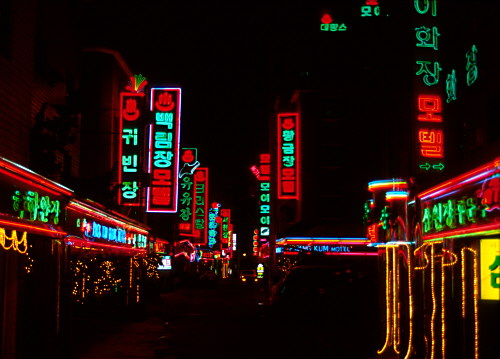Political Economy of Love Hotels
Despite of giving in my opinion too much emphasis to the capitalism-supportive function of the often loveless Korean families the Hankyoreh column by Chông Hûi-jin ("Political Economy of Motels") is worth giving a glimpse (supposing one reads Korean). Don't let the social science jargon trouble too much (even though columns like won't help taking Hankyoreh closer to the wider readership):But in Korea, 'extramarital relations' don't lead to 'destruction of marriage.' Koreans' love outside home is not contrary either to the familism (kajok igijuûi), "the basis of all social evil", or the family system, which volunteers for the maintenance of capitalism. It [love outside home] is actually functional. With the joys of extramarital relations, people can endure the hardship and dullness of the family system.  "Love" motels near Sillim 4-geori in Gwanak-gu, Seoul. (c) AL 2000 Categories at del.icio.us/hunjang: Koreansociety ∙ women-men ∙ family/kin |



Comments to note "Political Economy of Love Hotels" (Comments to posts older than 14 days are moderated)
Perhaps it's because a surprising number of Korean prefer not to have sex with their husbands on a regular basis after marriage. (and I know it's not just me--I know several other people who are unwilling marital celibates) Makes me wonder why we waited until we got married to "do it" (or even got married in the first place.
Write a Comment